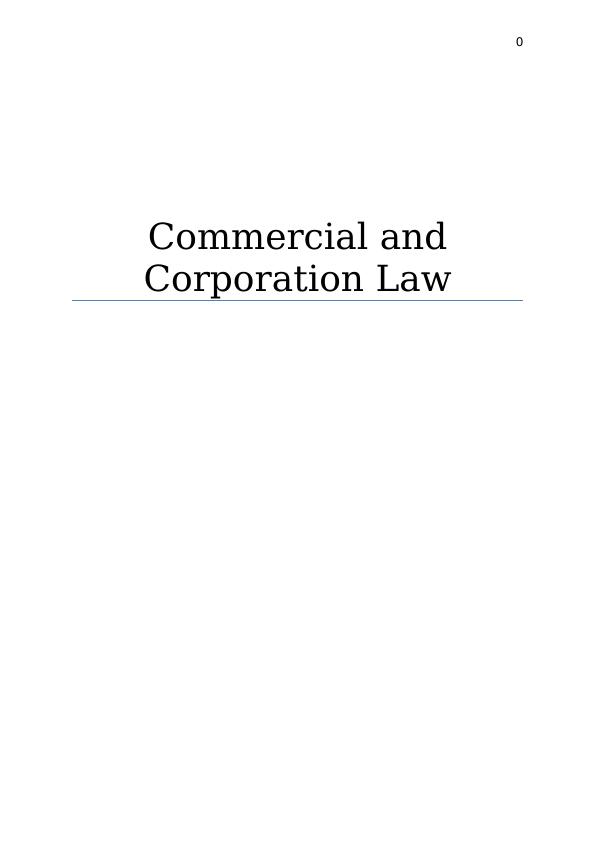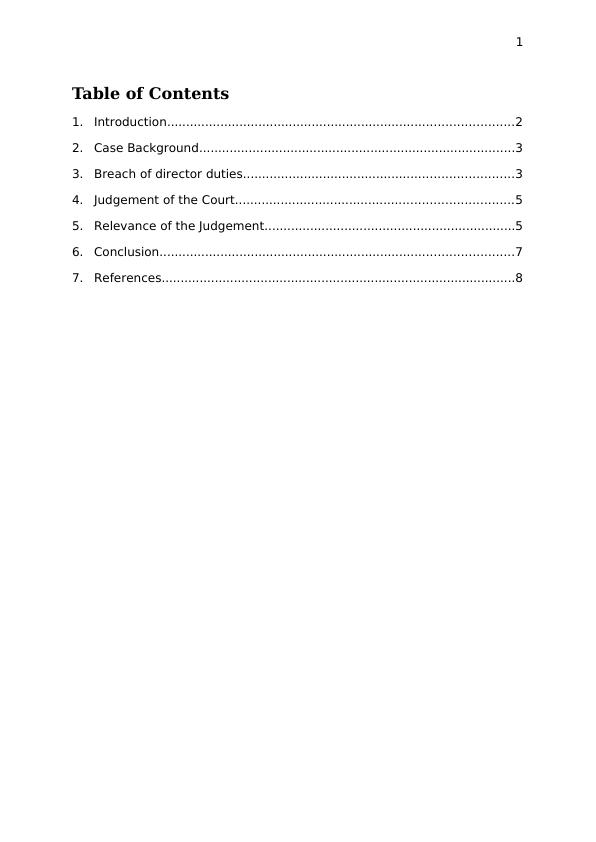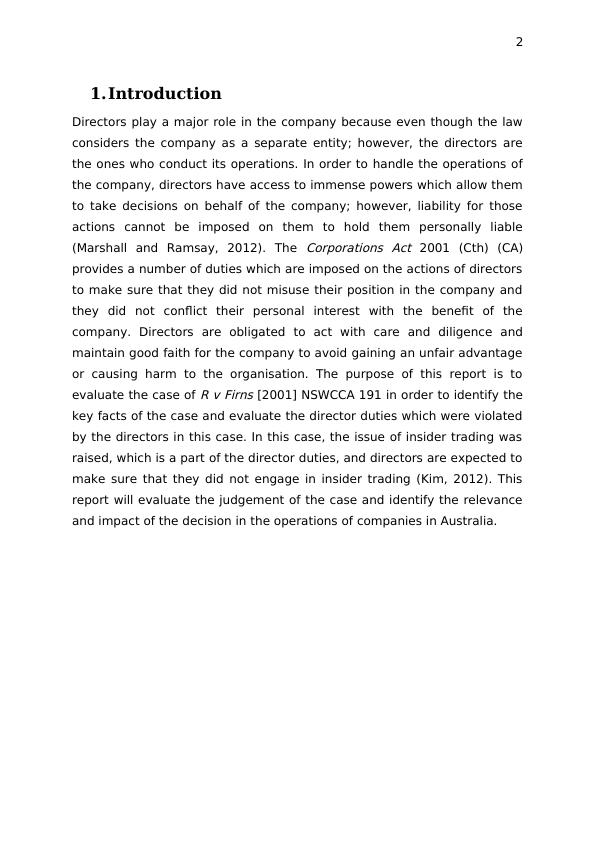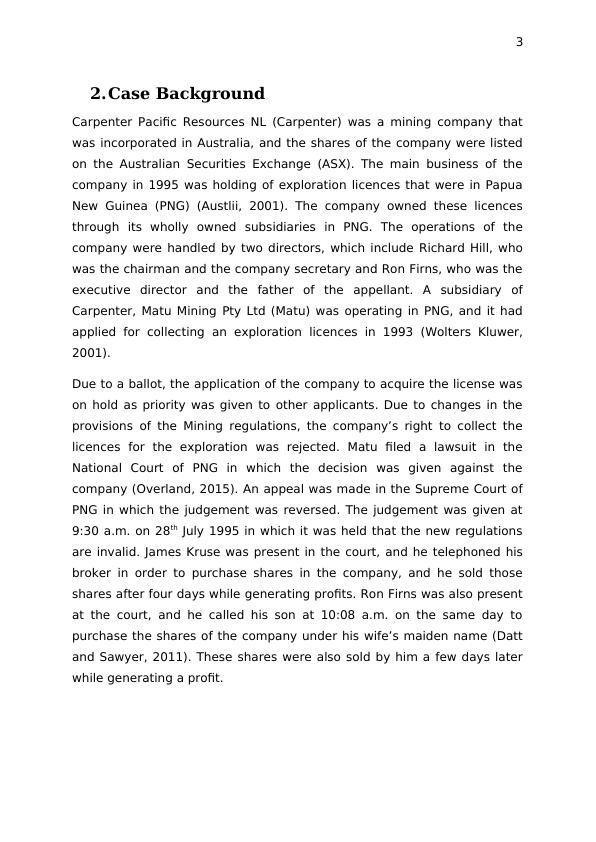Case Study: R v Firns - Breach of Director Duties and Insider Trading
Added on 2022-11-26
11 Pages2581 Words162 Views
0
Commercial and
Corporation Law
Commercial and
Corporation Law

1
Table of Contents
1. Introduction...........................................................................................2
2. Case Background...................................................................................3
3. Breach of director duties.......................................................................3
4. Judgement of the Court.........................................................................5
5. Relevance of the Judgement..................................................................5
6. Conclusion.............................................................................................7
7. References.............................................................................................8
Table of Contents
1. Introduction...........................................................................................2
2. Case Background...................................................................................3
3. Breach of director duties.......................................................................3
4. Judgement of the Court.........................................................................5
5. Relevance of the Judgement..................................................................5
6. Conclusion.............................................................................................7
7. References.............................................................................................8

2
1.Introduction
Directors play a major role in the company because even though the law
considers the company as a separate entity; however, the directors are
the ones who conduct its operations. In order to handle the operations of
the company, directors have access to immense powers which allow them
to take decisions on behalf of the company; however, liability for those
actions cannot be imposed on them to hold them personally liable
(Marshall and Ramsay, 2012). The
Corporations Act 2001 (Cth) (CA)
provides a number of duties which are imposed on the actions of directors
to make sure that they did not misuse their position in the company and
they did not conflict their personal interest with the benefit of the
company. Directors are obligated to act with care and diligence and
maintain good faith for the company to avoid gaining an unfair advantage
or causing harm to the organisation. The purpose of this report is to
evaluate the case of
R v Firns [2001] NSWCCA 191 in order to identify the
key facts of the case and evaluate the director duties which were violated
by the directors in this case. In this case, the issue of insider trading was
raised, which is a part of the director duties, and directors are expected to
make sure that they did not engage in insider trading (Kim, 2012). This
report will evaluate the judgement of the case and identify the relevance
and impact of the decision in the operations of companies in Australia.
1.Introduction
Directors play a major role in the company because even though the law
considers the company as a separate entity; however, the directors are
the ones who conduct its operations. In order to handle the operations of
the company, directors have access to immense powers which allow them
to take decisions on behalf of the company; however, liability for those
actions cannot be imposed on them to hold them personally liable
(Marshall and Ramsay, 2012). The
Corporations Act 2001 (Cth) (CA)
provides a number of duties which are imposed on the actions of directors
to make sure that they did not misuse their position in the company and
they did not conflict their personal interest with the benefit of the
company. Directors are obligated to act with care and diligence and
maintain good faith for the company to avoid gaining an unfair advantage
or causing harm to the organisation. The purpose of this report is to
evaluate the case of
R v Firns [2001] NSWCCA 191 in order to identify the
key facts of the case and evaluate the director duties which were violated
by the directors in this case. In this case, the issue of insider trading was
raised, which is a part of the director duties, and directors are expected to
make sure that they did not engage in insider trading (Kim, 2012). This
report will evaluate the judgement of the case and identify the relevance
and impact of the decision in the operations of companies in Australia.

3
2.Case Background
Carpenter Pacific Resources NL (Carpenter) was a mining company that
was incorporated in Australia, and the shares of the company were listed
on the Australian Securities Exchange (ASX). The main business of the
company in 1995 was holding of exploration licences that were in Papua
New Guinea (PNG) (Austlii, 2001). The company owned these licences
through its wholly owned subsidiaries in PNG. The operations of the
company were handled by two directors, which include Richard Hill, who
was the chairman and the company secretary and Ron Firns, who was the
executive director and the father of the appellant. A subsidiary of
Carpenter, Matu Mining Pty Ltd (Matu) was operating in PNG, and it had
applied for collecting an exploration licences in 1993 (Wolters Kluwer,
2001).
Due to a ballot, the application of the company to acquire the license was
on hold as priority was given to other applicants. Due to changes in the
provisions of the Mining regulations, the company’s right to collect the
licences for the exploration was rejected. Matu filed a lawsuit in the
National Court of PNG in which the decision was given against the
company (Overland, 2015). An appeal was made in the Supreme Court of
PNG in which the judgement was reversed. The judgement was given at
9:30 a.m. on 28th July 1995 in which it was held that the new regulations
are invalid. James Kruse was present in the court, and he telephoned his
broker in order to purchase shares in the company, and he sold those
shares after four days while generating profits. Ron Firns was also present
at the court, and he called his son at 10:08 a.m. on the same day to
purchase the shares of the company under his wife’s maiden name (Datt
and Sawyer, 2011). These shares were also sold by him a few days later
while generating a profit.
2.Case Background
Carpenter Pacific Resources NL (Carpenter) was a mining company that
was incorporated in Australia, and the shares of the company were listed
on the Australian Securities Exchange (ASX). The main business of the
company in 1995 was holding of exploration licences that were in Papua
New Guinea (PNG) (Austlii, 2001). The company owned these licences
through its wholly owned subsidiaries in PNG. The operations of the
company were handled by two directors, which include Richard Hill, who
was the chairman and the company secretary and Ron Firns, who was the
executive director and the father of the appellant. A subsidiary of
Carpenter, Matu Mining Pty Ltd (Matu) was operating in PNG, and it had
applied for collecting an exploration licences in 1993 (Wolters Kluwer,
2001).
Due to a ballot, the application of the company to acquire the license was
on hold as priority was given to other applicants. Due to changes in the
provisions of the Mining regulations, the company’s right to collect the
licences for the exploration was rejected. Matu filed a lawsuit in the
National Court of PNG in which the decision was given against the
company (Overland, 2015). An appeal was made in the Supreme Court of
PNG in which the judgement was reversed. The judgement was given at
9:30 a.m. on 28th July 1995 in which it was held that the new regulations
are invalid. James Kruse was present in the court, and he telephoned his
broker in order to purchase shares in the company, and he sold those
shares after four days while generating profits. Ron Firns was also present
at the court, and he called his son at 10:08 a.m. on the same day to
purchase the shares of the company under his wife’s maiden name (Datt
and Sawyer, 2011). These shares were also sold by him a few days later
while generating a profit.

End of preview
Want to access all the pages? Upload your documents or become a member.
Related Documents
R v Firns: A Case Study on Director Duties and Insider Tradinglg...
|14
|1123
|498
Corporations Law: Breach of Duties of Director in R v Firns Caselg...
|7
|2427
|88
ASIC v Padbury Mining Limited: Violation of Director Dutieslg...
|12
|1112
|491
Director Duties Breach in ASIC v Padbury Mining Limited Caselg...
|10
|2613
|306
Breach of Directors’ Duties under Corporations Act 2001 (Cth)lg...
|4
|787
|356
Director Duties and Violations: A Case Study Analysislg...
|10
|2300
|228
